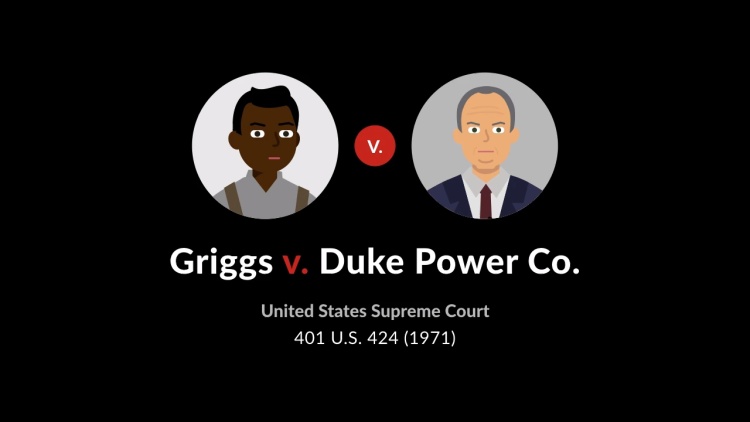Griggs v. Duke Power Co.
United States Supreme Court
401 U.S. 424 (1971)

- Written by Sara Rhee, JD
Facts
Prior to the enactment of the Civil Rights Act of 1964 (the Civil Rights Act), Duke Power Co. (Duke) (defendant) maintained a policy of open discrimination against Black employees. Black employees were categorically excluded from all but one of Duke’s departments: the labor department, in which the highest-paid employee earned less than the lowest-paid employee in any other department. In 1955, Duke began requiring a high-school degree for placement in any department other than labor and for transfer to any of the more desirable departments. Beginning on July 2, 1965, the date on which the Civil Rights Act went into effect, Duke added additional requirements. To be placed in any department other than labor or to be transferred to any inside department, Duke required passage of two aptitude tests in addition to the high-school-degree requirement. The tests purportedly measured general intelligence but had no relation to job-performance ability. A number of Black employees (plaintiffs) challenged the policy under Title VII of the Civil Rights Act. Both the district court and the court of appeals held that Duke’s policies reflected no discriminatory purpose and had been applied equally to Black and White employees. The court of appeals rejected the claim that because, in practice, the tests excluded a substantially disproportionate number of Black employees, it violated Title VII. The employees petitioned for review by the United States Supreme Court.
Rule of Law
Issue
Holding and Reasoning (Burger, J.)
What to do next…
Here's why 907,000 law students have relied on our case briefs:
- Written by law professors and practitioners, not other law students. 47,100 briefs, keyed to 996 casebooks. Top-notch customer support.
- The right amount of information, includes the facts, issues, rule of law, holding and reasoning, and any concurrences and dissents.
- Access in your classes, works on your mobile and tablet. Massive library of related video lessons and high quality multiple-choice questions.
- Easy to use, uniform format for every case brief. Written in plain English, not in legalese. Our briefs summarize and simplify; they don’t just repeat the court’s language.





